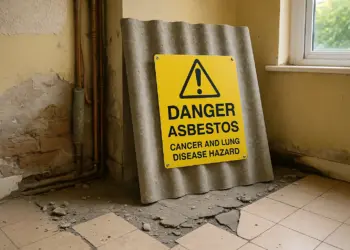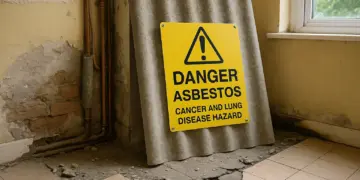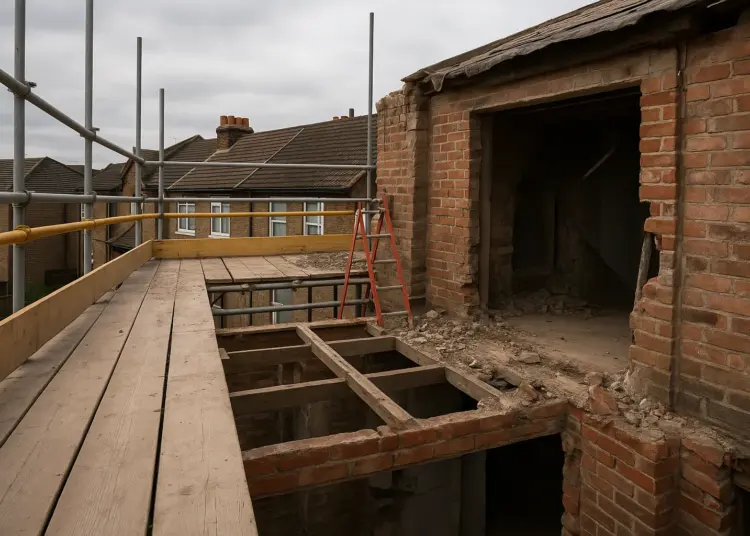Story Highlight
– Contractor received suspended sentence for unsafe work practices.
– Workers at risk of falling, ignored safety measures.
– Health and Safety Executive issued prohibition notice ignored.
– Mr. Ali ordered to complete 200 hours of community service.
– Community assistance led to his arrest for court appearance.
Full Story
A contractor has received a suspended prison sentence after putting workers’ lives in jeopardy by breaching safety regulations at a construction site in Willesden, London. Mohammed Mehdi Ali was found to have taken insufficient action to safeguard individuals working on the premises, prompting a notable response from the Health and Safety Executive (HSE).
The incident in question began on 7 September 2018, when HSE inspectors visited the site on Willesden Lane. Their investigation revealed that unsafe practices were being employed, including unmonitored work at height and unsanctioned demolition activities that could have resulted in serious injuries or even fatalities. It was particularly alarming that workers were present on the roof without any safety measures in place to prevent falls—one of the most significant risks within the construction industry.
After being issued a prohibition notice instructing him to halt operations onsite, Mr Ali neglected this order and continued with unsafe practices, endangering those employed there. This disregard for regulations prompted further legal action when Mr Ali failed to appear in court in 2021, leading to a warrant being issued for his arrest. Local community intelligence facilitated his arrest, allowing the court proceedings to progress.
In court, the 40-year-old, residing in Barn Hill, Wembley, was found guilty of failing to adhere to the prohibition notice as stipulated under Section 33(1)(g) of the Health and Safety at Work Act (HSWA). His actions not only defied the law but also demonstrated a blatant indifference toward the safety and health of his workforce. The court sentenced him to a suspended term of 20 weeks in prison, which will last for 18 months, and mandated that he complete 200 hours of unpaid community service along with 10 days of rehabilitation. He was also instructed to pay legal costs amounting to £12,151.
Saif Deen, an inspector from the HSE, expressed profound concern over Mr Ali’s negligence. He stated, “Mr Ali not only ignored HSE and the criminal justice system, he showed complete contempt for the safety of workers.” Deen emphasised the legal responsibilities of employers to ensure a safe working environment, noting that accommodating the health and safety of all personnel is paramount.
The HSE affirms that falls from height remain one of the primary causes of serious injuries and fatalities in the workplace. They have published extensive guidance on safe working practices when operating at heights and underscore that demolition work is governed by the same safety regulations as other construction activities. Proper supervision and adherence to safety protocols are imperative to exit the risks associated with such tasks.
Deen commended the local community’s role in this case, thanking residents for their vigilance and cooperation, which ultimately aided in ensuring that justice was served while promoting ongoing safety in workplaces.
This prosecution was handled by HSE enforcement lawyer Alan Hughes and paralegal officer David Shore, showcasing a collective effort to uphold worker safety standards within the construction industry.
The Health and Safety Executive remains committed to regulating workplace safety in Britain, continually striving to protect individuals from hazards and promote safer working environments across all industries. Further details regarding relevant legislation and updates from the HSE can be accessed through their official channels.























This case is a stark reminder that cutting corners on site safety can have severe consequences for workers and for those responsible. Work at height and demolition require robust planning, competent supervision and clear permit to work systems. Ignoring prohibition notices undermines the regulatory framework and puts lives at risk. Employers and contractors must ensure risk assessments are followed, training and supervision are effective, and that unsafe work is stopped immediately. Regulators and clients must also be vigilant in holding parties to account to prevent recurrence.
This case is a stark reminder that safety on site is non negotiable. Failing to control work at height and carrying out demolition without proper oversight not only breaches regulations but puts lives at risk. The sentence, while suspended, underscores that regulators and courts will take action when duty holders ignore clear hazards. Employers and contractors must ensure effective supervision, proper risk assessments, permit to work systems and compliance with prohibition notices to prevent harm and legal consequences.
This case is a stark reminder that safety on site is not optional. Allowing unmonitored work at height and unauthorised demolition shows systemic failure in planning and supervision. Those in control must ensure risk assessments are carried out, safe systems of work are enforced, competent supervisors are present and stop work when conditions are unsafe. Regulators and clients need to be vigilant and hold duty holders to account to prevent harm.
This case is a stark reminder that safety rules exist to protect lives on site. Uncontrolled work at height and unsanctioned demolition create obvious and serious risks to workers and the public. The suspended sentence and community service reflect the seriousness of the breach, but the focus now must be on preventing recurrence through robust site supervision, effective safety planning, strict permit to work procedures and prompt enforcement when notices are ignored. Employers and contractors must ensure training, adequate equipment and a culture where everyone stops unsafe work without fear of reprisal.